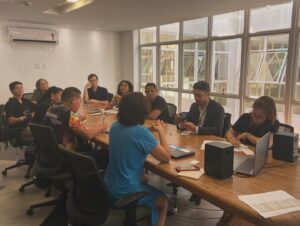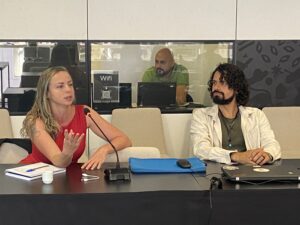“I am an Amazonian woman, daughter and granddaughter of fishermen, and for me, being in this space of thought and construction is a source of pride. My colleagues and I, who are also leaders in their communities, left here as builders of the SAP. We debated the program, made suggestions and created hope for our territories”. These are the words of Adenilse Borralhos, leader of the Women’s Movement of Espírito Santo do Tauá, a municipality in the state of Pará, in the Brazilian Amazon. She was one of the 50 participants in the National Workshop of the Strategic Actions Program (SAP) in the Amazon Basin, held on February 27 and 28 at ACTO headquarters in Brasilia and organized in partnership with the National Water and Sanitation Agency (ANA-Brazil).
During the two-day event, experts and representatives of traditional peoples and communities participated in two thematic working groups, one of which was responsible for discussing technical aspects related to Integrated Water Resources Management (IWRM) and the other was dedicated to local cultural aspects related to water. A third group was trained to increase the capacity of its participants to plan, monitor and evaluate gender mainstreaming in SAP implementation. The three groups, which also included 41 virtual participants from all over Brazil, had a common goal: to identify priority actions and make recommendations for program implementation.
The SAP, which was approved in 2017 by the eight Amazonian countries and is being implemented in the context of the Amazon Basin Project (ACTO/UNEP/GEF), foresees 19 actions to promote shared management of transboundary waters, designed to address the region’s nine priority problems, such as water pollution and biodiversity loss. Since August 2023, SAP implementation workshops have been held in the Amazon countries, bringing together governments and civil societies.
Promoting cooperation in the Amazon
The authorities present at the opening ceremony of the SAP Workshop in Brazil, including the Minister of Integration and Regional Development, Waldez Góes, were unanimous in stressing the importance of regional cooperation for the sustainable development of the Amazon. ACTO Executive Director Vanessa Grazziotin highlighted the efforts made by the organization and its member countries to establish integrated management of Amazonian water resources. “This workshop and all those we have been holding in other countries to implement the SAP are part of ACTO’s ongoing effort to promote regional cooperation in the Amazon Basin,” said Grazziotin.
Minister Waldez Góes, recognizing the role of ACTO in promoting cooperation among Amazonian countries, highlighted the work done in partnership with ANA to strengthen the integrated management of the region’s water resources. “Given the magnitude of the challenge we face, including extreme weather events, shared management of the Amazon basin is of strategic importance for the region’s sustainability, adaptation to climate change and biodiversity conservation,” said the minister.
Ana Carolina Argolo, Acting Director-President of ANA, highlighted the agency’s commitment to the SAP and to regional cooperation for the promotion of sustainable and resilient water use in the region. “I would like to emphasize here that our quest for water security in the Amazon region is national in scope. So our intention is that, at the international level, we can cooperate as much as possible with other countries,” Argolo said.
Representing the Minister of Environment and Climate Change, Marina Silva, the Acting Executive Secretary, Anna Flávia de Senna Franco, stressed the centrality of water management to achieve climate justice and social welfare in the Amazon. “We have to remember that where there is no water, there is hunger and social injustice. Water management is a fundamental tool for climate justice and social promotion […] The implementation of the SAP Program is a very important contribution to the results we want to achieve,” concluded Franco.
Recommended priority actions
The increased frequency of droughts and floods was the focus of the IWRM group discussions. The participants reinforced the importance of establishing hydrological monitoring networks and warning systems for the region, two of the SAP strategic actions being implemented by the Amazon Basin Project, and recognized that it is necessary to overcome the existence of technical, financial and other asymmetries between countries. The recommendation in this case is to seek financing for the operation and maintenance of networks and systems.
Regarding the establishment of protocols for monitoring water resources, the group recognized the fundamental role played by the Amazonian Network of Water Authorities (RADA), created in August 2023 during the Amazon Summit – IV Meeting of the Presidents of the States Parties to the Amazon Cooperation Treaty.
Among the other recommendations made by the group to increase IWRM, two refer to the need to increase hydrogeological knowledge of the region, since most of the population consumes groundwater, and to discuss management models for the Amazon Basin with the inclusion of Indigenous Lands and Conservation Units.
The cultural aspects group made two recommendations to improve water management, environment and sanitation, highlighting that the entire Amazonian culture is at risk due to the crisis in the quality and quantity of water resources, generating food insecurity, lower incomes and an increase in violence against women. The first recommendation is to guarantee, in accordance with Brazilian legislation and the UN Sustainable Development Goals, the participation and inclusion of traditional peoples and communities in national management and governance systems; the group’s second suggestion is to create a permanent transboundary commission of traditional peoples and communities within the framework of ACTO.
The participants in the gender training focused on the issue of gender mainstreaming in the implementation of the SAP, recommending its inclusion in the different phases of the projects, from the diagnosis to the monitoring and evaluation phases, designing specific strategies for each of them. The group also emphasized the need to guarantee the implementation of strategic gender actions in the budget. Another point considered central is the intersectionality approach to ensure the inclusion of other conditions of vulnerability, such as race, cultural identity, sexual orientation, gender identity and socioeconomic status.
According to the superintendent of Plans, Programs and Projects of the National Water and Basic Sanitation Agency, Flavia Oliveira, the recommendations of the workshop will guide the improvement of management in the Amazon Basin to include traditional peoples and communities. In addition, the importance of expanding warning systems to adapt the Amazonian population to increasingly frequent extreme phenomena (droughts and floods) was made clear.

















